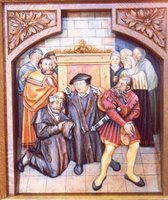Confession of Sins and Temporal Punishment
Q: As part of our confession of sin, we say we deserve temporal punishment. What is that?
 A: Depending upon the order of service used, many Christians (including Lutherans) speak words such as these regularly in preparation for the Divine Service: “I, a poor, miserable sinner, confess unto You all my sins and iniquities with which I have ever offended You and justly deserved Your temporal and eternal punishment. (Lutheran Service Book [LSB] 184)”
A: Depending upon the order of service used, many Christians (including Lutherans) speak words such as these regularly in preparation for the Divine Service: “I, a poor, miserable sinner, confess unto You all my sins and iniquities with which I have ever offended You and justly deserved Your temporal and eternal punishment. (Lutheran Service Book [LSB] 184)”I imagine that you’ve checked the dictionary and discovered several definitions, not all related. For example, the temporal bone is the part of the skull composing one’s temple. Interestingly, this comes from the same root as the adjective defining things pertaining to a house of worship. It stems from an Old English word for a defined space reserved for practicing divination or prophesying. Therefore, we might speak of temporal worship or temporal sacrifices.
The other major family of definitions stems from the Latin tempus (time). It may mean a transitory or temporary period of time (notice the same root). It may encompass any part of created existence, whether involving the duration of all Creation or individual life spans. The related adverb usually expresses the former idea. For example, when we say that we are temporarily unable to do something, we expect the situation to change, thus allowing us to complete the task. We don’t usually intend it to mean “until we die” or “until the world ends.”
As sinners who understand the fulness of God’s wrath, we realize that we deserve not only punishment “for a time” but “for all time” — and then for all eternity. Even if we could imagine a set amount of time being devoted to punishing each individual infraction, we still haven’t addressed the absolute spiritual corruption that is our inheritance from Adam. If there is no time when we do not carry a rebellious, anti-God spirit, then there is no time that we do not deserve His just punishment. Therefore, the essence of this confession is, “Dear God, I not only do bad things, I am, according to my inherited human nature, a bad person, incapable of the absolute perfection You demand. Therefore, heavenly Father, I admit that it is Your right and duty to punish me throughout my earthly days and eternally evermore.”
 However, confession is more than merely acknowledging God’s Word and admitting our sins and our sinfulness. It’s even more than being “heartily sorry for them,” as our rite continues. Judas admitted his wrongdoing: “He changed his mind and brought back the thirty pieces of silver ... saying, ‘I have sinned by betraying innocent blood.’ (Matthew 27:3-4)” Obviously sorry for what he did, he despaired and hanged himself.
However, confession is more than merely acknowledging God’s Word and admitting our sins and our sinfulness. It’s even more than being “heartily sorry for them,” as our rite continues. Judas admitted his wrongdoing: “He changed his mind and brought back the thirty pieces of silver ... saying, ‘I have sinned by betraying innocent blood.’ (Matthew 27:3-4)” Obviously sorry for what he did, he despaired and hanged himself.The Christian may experience terrors of conscience as strong as those that drove Judas to give up home. However, the believer also knows that he has a gracious God who inflicted His Son with our deserved temporal punishment before giving Jesus a taste of eternal torment, punishing Him with “hell on earth” by utterly forsaking Him (see Matthew 27:46). Because Christ suffered the fulness of the Father’s holy justice, we cling to the certainty of divine mercy and grace that grants us forgiveness of sins and an eternal life of peace and joy.
 Certain of God’s grace, our confession continues: “I am heartily sorry for them and sincerely repent of them.” Then, by faith, we ask our loving Father, “I pray You of Your boundless mercy and for the sake of the innocent, bitter sufferings and death of Your beloved Son, Jesus Christ, to be gracious and merciful to me, a poor, sinful being. (LSB 184)” Then the pastor — the “called and ordained servant” of the Word — says, “I announce the grace of God unto all of you and, by the command of my Lord Jesus Christ, I forgive you all of your sins in the name of the Father and of the Son and of the Holy Spirit. (LSB 185; cf. John 20:19-23; Matthew 16:19; 18:17-18)”
Certain of God’s grace, our confession continues: “I am heartily sorry for them and sincerely repent of them.” Then, by faith, we ask our loving Father, “I pray You of Your boundless mercy and for the sake of the innocent, bitter sufferings and death of Your beloved Son, Jesus Christ, to be gracious and merciful to me, a poor, sinful being. (LSB 184)” Then the pastor — the “called and ordained servant” of the Word — says, “I announce the grace of God unto all of you and, by the command of my Lord Jesus Christ, I forgive you all of your sins in the name of the Father and of the Son and of the Holy Spirit. (LSB 185; cf. John 20:19-23; Matthew 16:19; 18:17-18)”Order of Confession and Absolution quoted from Lutheran Service Book, © 2006 by Concordia Publishing House.
Scripture quoted from The Holy Bible, English Standard Version™, © 2001 by Crossway Bibles.
Send email to Ask the Pastor.
Walter Snyder is the pastor of Holy Cross Lutheran Church, Emma, Missouri and coauthor of the book What Do Lutherans Believe.
Technorati Tags: Confession | Absolution | Confession and Absolution | punishment | temporal punishment | eternal punishment | doctrine | theology | practical theology | Liturgy | worship | liturgics | systematic theology | Lutheran | Lutheranism | Christian | Christianity | Pastor Walter P. Snyder | Walter Snyder | Ask the Pastor
Newspaper column #550:1

0 Comments:
Post a Comment
<< Home